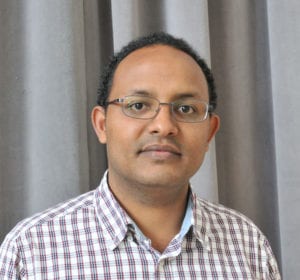
Trainee Author: Salman Tajuddin, MD, PhD
Postdoctoral Fellow
National Institute on Aging
(Photo courtesy Dr. Tajuddin)
This Trainee Paper Spotlight highlights three papers published back-to-back in the July 2016 issue of The American Journal of Human Genetics, which take advantage of large-scale exome array genotyping to better understand blood cell traits. Through meta-analyses of over 100,000 individuals, each paper provides insight into the genetic mechanisms that regulate different hematopoietic architectures.
Chami et al. examined several red blood cell phenotypes, identifying 16 genome-wide significant variants across the allele frequency spectrum. One rare variant was in ALAS2, a gene that previously associated with sideroblastic anemia in mendelian studies.
Tajuddin et al. examined white blood cell and subtype counts and identified 16 common variants associated with white blood cell traits, of which the majority have been pleotropically associated with autoimmune disease.
Eicher et al. assessed platelet counts and mean platelet volume, finding 50 new genome-wide associations not previously described in the literature, many of which are associated with platelet recovery. Interestingly, there was overlap between platelet associated variants with red blood cell and white blood cell traits, suggesting common regulatory pathways among different blood lineages.
Overall, these three papers, each first-authored by a trainee, add substantially to our understanding of the genetic architecture of blood cell traits, providing critical insight the pathophysiology of hematopoietic lineages. This Spotlight interviews ASHG trainee Salman Tajuddin, first author of one of the papers and co-author on the other two.
ASHG: Could you describe your research for us?
Dr. Tajuddin: My research is focused on understanding the role of genetic sequence variations (both common and rare), and their interplay with personal and environmental factors in the development of aging-related diseases and traits with particular emphasis on cardiovascular diseases. To this end, I use statistical methods and genetic data from population-based studies and collaborative genetics research consortia with the aim of translating genetic research findings into clinical diagnostics and intervention strategies.
ASHG: What are your career goals?
Dr. Tajuddin: After completing my postdoctoral fellowship training, I plan to transition to academic research to continue working in human genetics. I am also interested in teaching and mentoring the next generation of researchers in genetics.
ASHG: Why did you choose genetics as your field of study?
Dr. Tajuddin: Early on I was fascinated by biology, and later, medical school courses in molecular biology and genetics gave me the opportunity to greatly appreciate the fundamental role genetics plays in human health and medicine, and the consequences that occur when a gene or genes go wrong. This motivated me to pursue applied genetics research to discover mutations that drive disease development and to contribute towards disease treatment and improvement of public health.
ASHG: Describe yourself in three words.
Dr. Tajuddin: Curious, team player, and driven.
The Trainee Paper Spotlight highlights outstanding papers written by trainee members of ASHG. Submit your science to be featured, and join the ASHG Trainee Forum to keep up with new ones.
